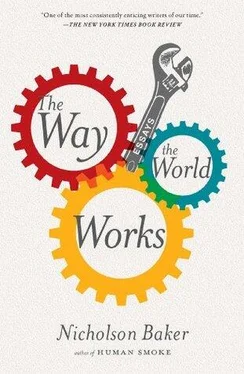Nicholson Baker - The Way the World Works
Здесь есть возможность читать онлайн «Nicholson Baker - The Way the World Works» весь текст электронной книги совершенно бесплатно (целиком полную версию без сокращений). В некоторых случаях можно слушать аудио, скачать через торрент в формате fb2 и присутствует краткое содержание. Год выпуска: 2012, Издательство: Simon & Schuster, Жанр: Публицистика, Критика, на английском языке. Описание произведения, (предисловие) а так же отзывы посетителей доступны на портале библиотеки ЛибКат.
- Название:The Way the World Works
- Автор:
- Издательство:Simon & Schuster
- Жанр:
- Год:2012
- ISBN:нет данных
- Рейтинг книги:4 / 5. Голосов: 1
-
Избранное:Добавить в избранное
- Отзывы:
-
Ваша оценка:
- 80
- 1
- 2
- 3
- 4
- 5
The Way the World Works: краткое содержание, описание и аннотация
Предлагаем к чтению аннотацию, описание, краткое содержание или предисловие (зависит от того, что написал сам автор книги «The Way the World Works»). Если вы не нашли необходимую информацию о книге — напишите в комментариях, мы постараемся отыскать её.
), here assembles his best short pieces from the last fifteen years.
The Way the World Works
OED
Modern Warfare 2
Through all these pieces, many written for
, and
, Baker shines the light of an inexpugnable curiosity.
is a keen-minded, generous-spirited compendium by a modern American master.
The Way the World Works — читать онлайн бесплатно полную книгу (весь текст) целиком
Ниже представлен текст книги, разбитый по страницам. Система сохранения места последней прочитанной страницы, позволяет с удобством читать онлайн бесплатно книгу «The Way the World Works», без необходимости каждый раз заново искать на чём Вы остановились. Поставьте закладку, и сможете в любой момент перейти на страницу, на которой закончили чтение.
Интервал:
Закладка:
I have been able to speak only a few words to Dowlin, Page’s boss, directly. At the end of May, he consented to an interview with me, provided I sent him, three days in advance, a list of questions. I mailed off the list; then, a few days before we were to meet, he (understandably) canceled the appointment, because, in the words of his likable secretary, “we are being sued.” In the Library Journal piece, Dowlin is quoted as saying, “I’m not convinced Mr. Baker understands the people of San Francisco and what they want. There are some people who disagree with what I wanted to do, but they’re about six years too late.” Dowlin told the reporter for SF Weekly that my account of the library’s extreme weeding was “bullshit,” and that my writing was “crap.”
Long ago, the library kept a “Withdrawal Register”—it appears on a WPA list of city records in the ’40s — but nothing like that is available now. (In the words of one librarian, “The card catalog is the mute witness to all of this destruction.”) As part of another public-records request, now Exhibit D of Baker v. San Francisco Public Library, I asked for “all records, including lists, card files. . computer records and printouts thereof, of books withdrawn, discarded, dumped, weeded, given away, sold, pulped, or otherwise removed from the library’s collections from 1987 to the present.” In the same letter I wrote, “Surely there is a record of the disposition of millions of dollars’ worth of city property.” The library administration’s official response, via the city attorney’s office, was “No list or compilation exists for books discarded or destroyed since 1987.” There was, however, a thirty-two-megabyte computer report entitled “Purge of Items Declared Withdrawn,” which principally covers items removed from the collection between January 1, 1995, and April 1, 1996. That report has never been printed out, for it would fill almost five thousand large-format computer-paper pages. It includes only things that were deliberately withdrawn, nothing missing or stolen; and it does not include NOFs, which were never in the computer. It took me two and a half hours to download it from the library’s file server. Kassim Visram, a systems analyst, ran some frequency analyses, which indicate that there are about 146,000 non-paperback books in the file — along with many phono disks, periodicals, cassettes, and so on. Amazingly, there are columns in the report headed “Last Copy” and “Last Main,” under each of which there appears either a “yes” or a “no” for each book; Visram could thus produce a file made up entirely of last-copy discards. I downloaded that smaller list of more than 17,000 books and sorted it again several ways myself. Some of the discards are not troubling — the departure of yet another edition of Gone with the Wind doesn’t represent an irreplaceable loss. But the last copy of Darwin’s The Movements and Habits of Climbing Plants (in a 1901 edition) caught my eye; and I saw more than a thousand Chinese books, hundreds of books in German and Italian, and an appalling number of research-level monographs in the sciences. History was hit particularly hard in my sample, especially (for some reason) history published by the Cambridge University Press: listed were the last copies of works by Sir Herbert Butterfield, Henry St. John Bolingbroke, William Stubbs, C. V. Wedgwood, and Lewis Namier. There were last copies of hard-to-find books by Muriel Spark, Goethe, and William Dean Howells.
According to the Automation Services Department, there was at least one earlier purge report, run in 1995, covering discards from some point in the past through the end of 1994. That purge report was itself purged, however; it doesn’t exist on any backup tape or disk. “That’s a report that hasn’t existed on the system for a long time,” I was told. “We did do a purge of withdrawals in May of 1995, but generally we don’t keep those files around for very long, because once they’re withdrawn and gone, there’s really no need to keep a history of that.”
I can’t agree.
(1996)
If Libraries Don’t Do It, Who Will?
Remarks Delivered at the Ribbon-Cutting Ceremony for the
Library Service Center, Duke University Libraries
Thank you, and good afternoon, everyone. I’ve never commemorated the opening of a building before, and I must say it’s an enormous pleasure and an honor to be here, standing in front of this large beige building, to talk about the storage of paper. Paper storage has been on my mind a great deal lately, because last year I started a little library that has in it twenty or thirty tons of bound newspapers, all sold off by the British Library. When the sale actually went through — I didn’t want it to go through, I wanted the library to keep the papers — but when it did, I began to have yearning thoughts about storage. I would drive by some undistinguished steel-sided building, painted some shocking color, and I’d spot those beautiful words FOR LEASE on it, and it would call out to me: storage . I saw a FOR LEASE sign on a converted mill one day and I called the number; the developer said, “I can show you the mill, but I’ve got something better for you. I want to show you something that is a dream space, top of the line, and I know it may be more than you can do costwise, but I just want you to see this and I want you to think about it.” I said okay, and my wife and I took a drive with the developer to a navy base, and we parked in front of an enormous stone building with towers and parapets. It looked like a gigantic medieval fortress. What was it? It was the navy prison. There was a vast rusting cell block with prison cages that went up many stories, and a crumbling men’s room that in its bleak ruination stretched back into the shadows, with maybe thirty sinks along one wall, none of which worked. I was very tempted — but in the end, it just didn’t seem like the right place to keep the last surviving twentieth-century runs of the Chicago Tribune, the New York Herald Tribune, and the New York World .
So I now know, more than I ever did before, about the deep and abiding joy that comes from having enough space — and even now I sometimes feel a slight envious resentment rising within when I cruise down a big highway near New York City and I see buildings that have fifty truck bays. What are they holding? They’re holding cheese products, or truck parts, or Happy Meal toys, or Pentium computers that will be scrap in five years. They’re not holding books. One tank depot or tire warehouse would hold everything that our national library has been sent, free, by publishers and has rejected every year. Our national library says that they don’t have enough space, and they are unwilling to lease space, even though they’re willing to budget 94 million dollars for digital projects.
So here we have a building that has one purpose — to store books — books that we can carry around, flip through, and read just as they were meant to be read by their creators. There’s a cherry picker machine inside, a state-of-the-art cherry picker, that lifts a book retriever up thirty-two feet, where he or she gets the book out of a cardboard tray and comes down with it. And there will be two and a half million books in here. The cost was seven and a half million dollars — so this brand-new place cost about three dollars a book to build. Very few of the books that are going in here have been digitally scanned — and here’s the dramatic comparison. To store a nineteenth-century book, it costs three dollars a book, plus an estimated seventeen cents a book in maintenance and staffing; to scan a nineteenth-century book, it costs a hundred dollars a book. And the book doesn’t even need batteries! Not that it’s a bad thing to take digital pictures of books, as long as the picture-taking doesn’t require that the book be cut out of its binding — the electronic versions can be extraordinarily useful. The point is that offsite book storage, even traditional storage in call number order, is cheap, and any scanning or microfilming we do should be done with the expectation that the original book go back into the collection when the copying is done. And it’s compact, too—2.5 million books go in here, and across the street, an even bigger building is devoted to doing the laundry. Besides being things of intrinsic beauty and interest, books are marvelously compact.
Читать дальшеИнтервал:
Закладка:
Похожие книги на «The Way the World Works»
Представляем Вашему вниманию похожие книги на «The Way the World Works» списком для выбора. Мы отобрали схожую по названию и смыслу литературу в надежде предоставить читателям больше вариантов отыскать новые, интересные, ещё непрочитанные произведения.
Обсуждение, отзывы о книге «The Way the World Works» и просто собственные мнения читателей. Оставьте ваши комментарии, напишите, что Вы думаете о произведении, его смысле или главных героях. Укажите что конкретно понравилось, а что нет, и почему Вы так считаете.












